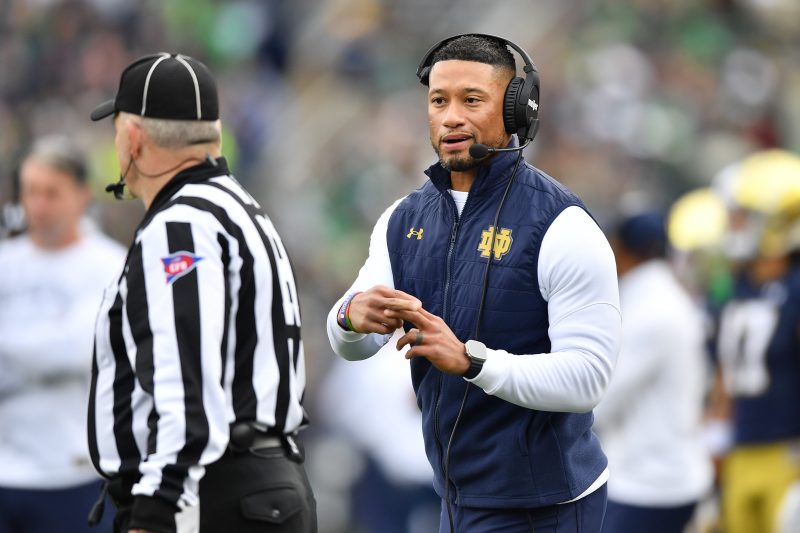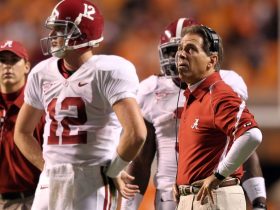As long as Notre Dame coach Marcus Freeman works in college football, he’s going to be fighting one of the most insidious stereotypes in sports.
No, not because he’s one of the few Black head coaches at the Bowl Subdivision level. Not because he’s leading one of the game’s blue bloods at just 38 years old. And not because he’s widely considered the most handsome coach in a profession of people who perpetually look like they need more sleep and more salads.
No, the thing that will always be held against Freeman at Notre Dame is that he’s really, really nice.
Football fans are naturally suspicious of nice coaches. It doesn’t comport with the image of Bear Bryant stalking the sidelines with a scowl or Nick Saban blowing up into a rage whenever somebody around him screws up.
For a college football coach, being a relatively pleasant person who has normal human interactions, treats people with respect and doesn’t show anger publicly can be dangerous. Because whenever something goes wrong, the personality traits we value highly in real life get twisted into the reason why a team isn’t performing well. Is he not demanding enough? Is he trying to be too buddy-buddy with the players? Do they play poorly because they don’t fear him?
These are, of course, completely unfair critiques. We don’t really see what goes on in any program outside of 12 Saturdays a year. We don’t know how Freeman or any coach interacts with his team behind closed doors.
But what we have are the results, and fans will always evaluate them through the prism of their assumptions.
That’s really problematic for Freeman because of what happened Saturday when Notre Dame lost to Northern Illinois, 16-14.
“We’ve been here before,” Freeman told reporters.
Yeah, and that’s exactly the issue.
Freeman’s tenure is just 29 games old, but there’s been a concerning and unmistakeable trend: The Irish quite simply don’t show up to play every week.
Sure, Notre Dame has had some really great moments under Freeman, including last Saturday when the Irish gutted out a 23-13 win at Texas A&M. But there have been far too many head-scratching, out-of-nowhere losses than should be acceptable at Notre Dame.
It can happen to anyone once in a blue moon. But losing to Marshall, a 3-9 Stanford team and now Northern Illinois in fewer than 30 games reflects a level of inconsistency that is deeply concerning and needs to be corrected. Even last year, after Notre Dame played an incredible game in a 17-14 loss to Ohio State and then came back the next week to beat a good Duke team, the Irish went to Louisville and really got embarrassed in a 33-20 loss that wasn’t as close as the final score.
Great programs don’t have these wild swings in performance, and the question for Freeman and Notre Dame is why it’s still happening three years into his tenure.
There’s almost certainly an answer more complicated and nuanced than Freeman being too nice of a guy to lead a program with Notre Dame’s expectations. But it’s the critique that is going to resonate the most within a fan base that is growing impatient — and rightly so — with their team laying a couple eggs per season.
That’s why the Fighting Irish rank No. 1 in this week’s Misery Index, a weekly measurement of which fan bases are feeling the most angst.
Four more in misery
Colorado: It’s not any better. In some ways, it’s worse because Year 2 is when the great coaches usually start to foreshadow their greatness. But all the problems that caused the Buffaloes to fizzle to 4-8 last year under Deion Sanders are still problems. The offensive line is pitiful, which means Colorado can’t run the ball and quarterback Shedeur Sanders is scrambling for his life most of the time. The defense, if we’re being generous, is mediocre. After watching Colorado’s 28-10 loss to Nebraska, there’s really no reason to believe Coach Prime is on the verge of anything this season other than ridicule and scrutiny over much of an underachiever he’s been in high school recruiting since arriving at Colorado.
Arkansas: The litany of mistakes and just outright bonehead decisions coming from the Razorbacks’ sideline Saturday in a 39-31 double overtime loss at Oklahoma State would take the rest of the month to explain. But it can all be summed up very succinctly in the fact that Arkansas out-gained Oklahoma State 648-385 and still lost the football game. Statistically, that’s almost impossible. But it happened thanks to a 3-1 turnover deficit (including a muffed punt that set up the game-tying score in the fourth quarter), some poorly timed penalties, clock management issues, a pair of missed field goals and a few other missed opportunities to put points on the board. But maybe there’s a reason Arkansas is 3-10 in one-score games over the last two years. This one may be tough for Sam Pittman (24-26 overall) to live down, especially with Bobby Petrino as offensive coordinator waiting in the wings if there’s a midseason coaching change.
Auburn: It’s not like Auburn was shy about paying for good football, even when NCAA rules made it more complicated (take that however you like). And it’s not like Hugh Freeze, for all the controversy that has surrounded his career, has ever dealt with questions about his ability to put a good offense on the field. So what gives? How is it that as Freeze enters Year 2, he’s still wedded to a quarterback in Payton Thorne who just can’t get the ball down the field? After ranking 92nd nationally last year, Auburn’s offense is still stinky. That much is clear after a 21-14 loss at home to California in which Thorne threw for 165 yards and Auburn had just 286 total yards while committing five turnovers. If you’re not getting offensive production out of a Freeze-coached team, what are you really getting? His inability to get a quarterback upgrade out of the transfer portal this past offseason may land him on the hot seat pretty quickly.
Florida State: Sorry Seminoles, but you don’t get to avoid the Index just because you didn’t play on Saturday. Your 0-2 start to this season is too glaring to ignore. It’s one thing to lose to Georgia Tech in kind of a funky game in Ireland to open the season, but when you come back home and get physically dominated by Boston College then it’s time for a serious conversation. Did FSU spend the entire offseason in a program-wide funk because it got left out of last year’s College Football Playoff? Did coach Mike Norvell just whiff in the transfer portal this time? Was last year’s quarterback Jordan Travis just way better than anyone gave him credit for? All of those theories are on the table to explain how bad Florida State has looked. But with a very good Memphis team coming to Tallahassee next week, the Seminoles better snap out of it or else the 2024 season will effectively be over.
Miserable but not miserable enough
Michigan: The championship banner from 2023 will hang forever, but the bill has come due in 2024. The Wolverines are headed into the wilderness of being a juiceless, middling program under a first-year head coach in Sherrone Moore who has a long way to go to prove he’s got the gravitas to make this happen in the Big Ten. Bottom line, Michigan was not competitive at all in a 31-12 loss to Texas on Saturday. Though the Longhorns are very good, Michigan is in a full post-Jim Harbaugh rebuild under a coach who has zero track record of running a program. Good luck!
Cincinnati: With fewer than 20 minutes remaining Saturday, the Bearcats led Pittsburgh 27-6. Though hardly any leads are safe in college football these days, that’s a game you’re going to win nine out of 10 times. Unfortunately for the Bearcats, this was the one that got away. From the moment of Cincinnati’s final field goal with 4:50 remaining in the third quarter until the end of the game, the Bearcats had the ball four times. They ran 17 total plays, punted three times, used up fewer than eight minutes of the clock and allowed Pittsburgh to storm back with three consecutive touchdowns and a field goal with 17 seconds remaining for a 28-27 victory. It would be hard to script a more disappointing loss.
Tulane: We typically avoid officiating controversies here at the Misery Index, but it’s hard to ignore the injustice that caused the Green Wave to suffer a 34-27 loss to Kansas State. With 17 seconds remaining, Tulane’s Dontae Fleming got called for an offensive pass interference, negating a touchdown for teammate Yulkeith Brown that could have either tied the game or put Tulane in position to go for two and the win. These calls are always difficult and subjective, but when you look at the replay there’s just not much there. Fleming did make contact with a defensive player, but it was the kind of mutual engagement that isn’t usually called as a pick play. Green Wave fans will be bitter about this one for a long time.
Iowa: Losing to an in-state rival is always tough. Losing to an in-state rival after leading 19-7 late in the third quarter is even tougher. And blowing a two-score lead when you typically have one of the best defenses in the country is almost inconceivable. But the Hawkeyes somehow have to swallow a 20-19 defeat at the hands of Iowa State, which scored 13 points in the last 20 minutes to steal a huge victory in Iowa City. Give a game ball to Kyle Konrardy, who made 46- and 54-yard field goals in the fourth quarter for the Cyclones, but Iowa was only in that vulnerable position because its offense completely shut down. Its final six drives went for three, minus-2, zero, 14, eight and zero yards.
Kentucky: The offensive statistics are horrifying. Kentucky had just 183 yards in a 31-6 home loss to South Carolina, and as has happened way too often in the Mark Stoops era, the Wildcats just can’t throw the ball. Highly touted Georgia transfer Brock Vandagriff went 3-for-10 passing for 30 yards, while Gavin Wimsatt was 3-for-7 for 14 yards. Kentucky has been really resourceful over the years, with Stoops managing to post seven out of 11 winning seasons despite often having offensive issues. But after watching this performance against the Gamecocks, Kentucky fans may truly have reason to fear that the bottom is going to fall out.







